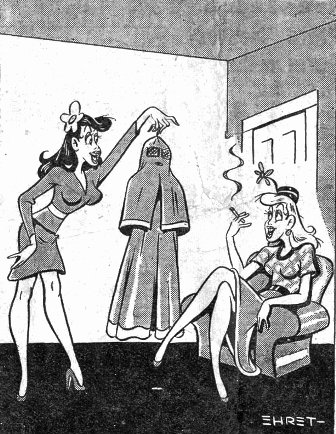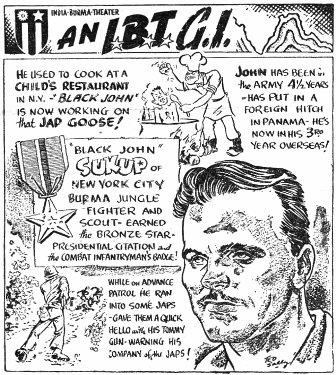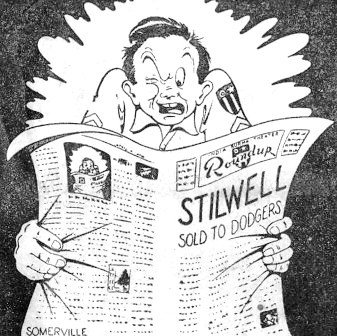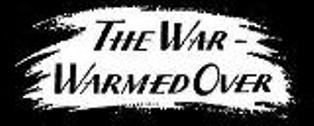|
Marsmen Under Fire
GEN. SULTAN'S HQ., BURMA - Prompt frontline medical treatment performed under enemy fire by officers and men of portable surgical units attached to the Mars task Force is credited with establishing low mortality rates among American and Chinese soldiers wounded in recent action against the Japs in Central Burma.
Emergency operations, performed in the field under enemy artillery and mortar fire, and prompt evacuation of wounded under similar conditions, were contributing factors in saving the lives of seriously wounded soldiers, who are now recovering in rear echelon hospitals.
One portable surgical unit, which marched more than 300 miles with the Mars Task Force, established a mortality rate of 1.74 percent in 102 major and 127 minor operations performed on wounded soldiers in the field. Patients included Americans, Chinese, Palaungs, Kachins, and Shans, as well as Jap prisoners. All received the same care.
UNDER LOG
Capt. Joseph P. Worly, of Indianapolis, Ind., saved the life of one man who was wounded when a Jap shell made a direct hit on a dugout, killing two men and wounding several others. Capt. Worly found the man trapped by a heavy log from the dugout roof, which lay across one leg that was severed to the bone by a piece of shrapnel.
Other soldiers tried unsuccessfully to remove the log from the wounded man's leg. When they failed, Worly sent his medical assistant, S/Sgt. Anthony Scarpelli, Bronx, N.Y., for an emergency kit.
Worly told the still conscious soldier that he would have to amputate the leg. The soldier answered, "Okay, Doc, you know your business."
AMPUTATION
When Scarpelli returned with the kit, Worly discovered that the scalpel was missing, so he drew out his scout knife and proceeded with the operation. Using Scarpelli's belt for a tourniquet, Worly amputated the wounded man's leg with the knife, and then administered two quarts of blood plasma. The entire operation was performed under enemy artillery fire.
The man was evacuated from the front shortly afterwards and was flown to an evacuation hospital, where six pints of whole blood were administered. The donors were fellow soldiers from the Mars Task Force. The casualty is now recovering in a rear echelon hospital. At his bed table is a picture of his sweetheart, which Worly found in his fatigue jacket and forwarded to him.
A lieutenant in the 124th Cavalry Regiment, a unit of the Mars task Force, is also recovering after emergency treatment in the field by Maj. Paul Mecray, Jr., of Philadelphia, Pa., who was on detached service with a portable surgical unit.
HOLE IN WIND PIPE
The officer was brought to Mecray's unit with a hole in his windpipe caused by exploding shrapnel. Inserting his finger into the hole, Mecray attempted to remove blood that was flowing into the patient's trachea. The lieutenant stopped breathing when a blood clot formed there and Mecray immediately placed his mouth over the wound and sucked the blood clot out of the windpipe, after which he inflated the patient's lungs again by blowing into the open wound. The lieutenant is now convalescing at a rear echelon hospital.
Portable surgical units commanded by Maj. William King, of Burlington, Wash., a veteran of the Aleutians campaign, and Capt. Ira Teicher, of Brooklyn, N.Y., who served for two years in the Persian Gulf command, have been with the Mars Task Force since it set out from Myitkyina, North Burma, last November.
At one point the two officers established a stretcher shuttle service for sick and wounded soldiers. Medical aidmen from the two units frequently were forced to make three-day marches over the mountains with their litter patients in order to reach evacuation points.
SHANS HELP
During combat, aidmen were assisted by native Shans who served as litter bearers. Several of them were killed by Jap artillery fir and a number of others wounded.
Many lives were saved by the work of the 10th Air Force sergeant-pilots who fly the tiny liaison planes used for evacuation of wounded from the front.
Lt. Col. Wilbur W. Hiehle, of New York City, who commands the Mars Task Force medical personnel, attributes the low mortality rate of wounded as much to the sergeant-pilots as to the personnel of the portable surgical units.
"These boys fly their heads off for us," said Hiehle. "I don't know what we would do without them."
Use of a special type of medical field equipment made possible transfusions of whole blood to patients in the field. One wounded man received six such transfusions at the front and lived.
Pilots Learn Dangers of Idle Conversation
Roundup Staff Article
Latest saga of the Air Corps is the story of S/Sgts. John E. Byrnes of Kingston, N.Y., and Jim Richardson of San Antonio, Tex., concerning an Indian Army lieutenant of the 33rd Corps.
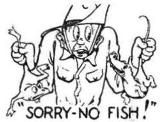
|
Byrnes and Richardson, liaison pilots with the First Air Commandos, were evacuating wounded from the battle near Mandalay. On one of their missions they landed on the sandy bank of a river in which Indian soldiers were swimming.
Byrnes hollered to a nearby soldier, "Hey, Joe, any fish in that water? Malum fish?"
Evidently the Indian didn't malum for he gave them a puzzled look. The Yanks laughed and taxied their L-5's over to a waiting ambulance.
No sooner had they cut their engines than the Indian soldier appeared, accompanied by a lieutenant.
"My corporal says you asked him something and
|
OLD MAN ROAD NEW YORK - (UP) - Lord Louis Mountbatten was in a plane making a routine inspection tour, according to New York Post Columnist Leonard Lyons, when he looked down, studied his map, then asked, "What river is that down below? I don't see it on my map." Replied his aide, "That's not a river, that's the Ledo Road." |
"Why yes," stammered Byrnes. "We asked him if there were fish in the water."
"Fish?" puzzled the lieutenant. "Well, I dunno." He broke off to shout some orders in Hindustani to Sepoys who had crowded around. immediately a munitions man appeared on the double with a block of dynamite.
Under orders from the lieutenant, the charge was assembled, fused and thrown into the river. As the confounded G.I.'s looked on, came an explosion and into the air flew a geyser of mud, frogs, lizards and weeds. The sound of the blast echoed and there was silence.
Then the lieutenant folded his arms, looked at the sergeants and drawled "Sorry, old chaps, no fish!"
|
HITS 50,000 MONTHLY
Roundup Staff Article
More than 50,000 gasoline drums, each with a capacity of 55 gallons, are being manufactured monthly at a forward area plant built and operated by the U.S. Army, it was announced this week by Maj. Gen. W. E. R. Covell, chief of Services of Supply, India-Burma Theater.
The plant's manufacturing equipment is a duplicate of that used in the most modern U.S. centers, and was brought here from the States.
The drums are designed specially for "Hump lifting" high octane gas and for rough handling necessitated by travel in China. This is the only plant of its type in the Far East, and is operated by the Theater QM Large Drum Manufacturing Detachment and one pioneer casual labor battalion under Capt. Frank B. Vance.
The plant was built in less than three months, starting in December, 1944, under the general supervision of Capt. Robert McCreery of the Office of the QM General in Washington. McCreery is a specialist in this line, the India-Burma plant being the ninth he has served in a similar capacity.
The plant was built by the Engineers. It is under supervision of Chief Quartermaster, SOS. The first drum was completed March 6. WD civil personnel assisted McCreery.
The equipment arrived in November and ground was broken on December 28. McCreery arrived here in October.
Meantime, in the States the QM Corps had assembled technical men to operate the plant. The men were scattered throughout civilian plants in the States for refresher courses after being assembled at Camp Lee, Va.
More than 100 tons of material have to be shipped from Calcutta daily by the Transportation Corps to keep production at peak.
SOS Perfects AMSAC for
Forward Areas Parachute Dropping
Called AMSAC, a new streamlined container for dropping supplies by parachute, costing $3.50 each, where old-style baskets cost $54 apiece, has been perfected by Services of Supply.
The new container, which occupies only one-seventh of the space taken up by the old-type baskets, was developed by Lt. Riley G. Jones, officer-in-charge of the Quartermaster Specifications Branch.
The container is made in India by Indian labor, and utilizes Indian products exclusively.
Loads up to 465 pounds have been dropped from planes in the new container in planes flying 130 miles an hour at an altitude of 150 feet and under conditions similar to those in many parts of Burma where troops depend entirely on air-dropped supplies.
The old-type basket container could carry only 200 pounds in actual operations, 360 pounds will constitute the maximum load. The additional capacity will be a factor for emergencies.
When filled, the new sack is a burlap-covered bale 21 inches square at the ends and 36 inches deep.
|
NEW YORK - (UP) - Two playwriting lieutenants, Richard Woodworth and Howard Marshall of the Air Transport Command's India-China Division, returned to the United States on leave this week and found themselves well launched on the road to fame.
The pair of drama-minded officers wrote a play called The Hump during their more than 20 months in Assam, and Producer John Wildberg and Director Harry Wagstaff Gribble, the team responsible for the popular play, Anna Lucasta, said it will be staged here by late autumn.
The play deals with new fliers and what happens to them on their first mission. It starts with two men moving gear into a locker belonging to two men who didn't come back.
HUMP IN '43
The producers are so enthusiastic about The Hump that they call it the "Journey's End of World War II."
The action occurs during 1943 when activities of Hump flying were little known.
With the war in Europe coming to an end, the attention of the nation is sure to focus more and more on other fronts, according to Press Agent Ivan Black, who expects a long run for the play.
Woodworth, 26, who has 43 round trips over The Hump to his credit, was an actor on the straw hat circuit and studied at drama schools in Hollywood and New York before he entered the Army. Marshall, with 40 missions, graduated from Dartmouth in 1940 and worked for the Manchester, N.H. Union before the war.
MAY ACT
The producers said that the two playwrights would get a chance to act in their own play if they're out of the Army before production begins - scheduled for August 30. Many other CBI veterans who were actors have been clamoring for parts, according to the producers, who said, "And why not - if they're actors and also look the part, what could be better?" All characters are men, incidentally.
Director Gribble received his copy of The Hump at 4 o'clock one afternoon and bought it by 6:30. His partner, Wildberg, read 150 war plays before picking it.
SULTAN'S MEN CLOSE TRAP IN BURMA
Roundup Staff Article
Troops of Lt. Gen. Dan I. Sultan's Northern Combat Area Command continued their drive south in Burma this week, closing the trap on Japanese units caught between them and the British 14th Army units, around the Mandalay area.
Chinese troops, who struck out from captured Hsipaw, occupied Kyaukme, 20 miles to the west, where they joined up with the 36th Division of Maj. Gen. Francis W. Festing. Other Festing men hit south of Namsaw to reach the main Mandalay-Lashio Road, about 26 miles from Hsipaw.
70 MILES CLEARED
Sultan's three-pronged drive for the Hsipaw-Kyaukme line has cleared the Burma Road 70 miles through Hsipaw and southwest of Kyaukme, which is two miles north of the main Mandalay-Lashio Road and on the railroad between the two towns.
Meantime, the Japs battered fruitlessly against the British 14th Army hold on the Meiktila area, which blocks the escape routes south to Rangoon. The Nips are still firmly held in the Mandalay-Myingyan-Meiktila triangle, with their only escape corridor east through the mountain passes to Thailand.
KYAUKSE CAPTURED
Other 14th Army troops have driven south in Central Burma, capturing Kyaukse and establishing contact with other forces heading west from Meiktila.
Eastern Air Command heavies heavily bombed a major enemy base three miles northwest of Rangoon Railroad Station against weak ack-ack and no air opposition. B-24's of the Seventh Bomb Group and RAF Liberators took part in the raid.
Tokyo radio announced that their air force had bombed the seaport of Akyab in the Arakan, British supply base.
Soldier Medals To 10th AF Men
HQ., 10TH AIR FORCE, BURMA - Eleven officers and men of the Tenth Air Force were recently awarded the Soldier's Medal for three airplane rescues at base in Burma and India.
Disregarding the danger of fire and explosion, Maj. Morgan S. Tyler, Casmalia, Cal., and five members of a fighter group rescued several crewmen from a heavy bomber that had crashed at a forward base. Assisting Tyler were S/Sgt. Gerald J. Muchera, Milwaukee, Wis., Sgt. Ernest Dingeldein, Chilton, Wis., Sgt. Michael Raab, Philadelphia, Pa., Cpl. Ernest L. Carter, Culver, Ind., and Cpl. John L. King, Bridgeport, Conn.
At another 10th Air Force base, a medium crashed and burned. Two officer members of the crew, after getting clear of the burning wreckage, realized that crew members were still trapped inside. Notwithstanding their own injuries and the hazards of the flames and explosion, Lts. Marvin M. Brucker, Montezuma, Kans., and Karl H. Meyer, Buffalo, N.Y., entered the Mitchell bomber and removed the sole survivor.
Three other Air Force officers were also awarded the medal for their heroic action in saving the life of a fighter pilot. The plane had crashed in flames on landing and at the risk of their own lives, Lts. Roy J. Johnson, Escanaba, Mich., Harold P. Rouse, San Jose, Cal., and Percy E. Stanton, Palisades Park, N.J., dragged the pilot to safety.
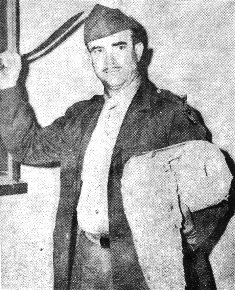 Indian jewel wallahs who have been snickering in their gimlets over G.I. suckers will probably die of frustration
at this news. Pvt. Thomas W. Linville won the above, identified as a priceless Tibetan prayer wheel, in a card game
in Calcutta. Linville didn't know its value, and not knowing what else to do with it, carried it around in his
barracks bag. Now back in the States, he found the value of his winnings, with the jewels alone estimated at $100,000.
The Gurkha knife identifies him as a Calcutta Commando. We can just hear the screams from the weeds at the corny pose.
Indian jewel wallahs who have been snickering in their gimlets over G.I. suckers will probably die of frustration
at this news. Pvt. Thomas W. Linville won the above, identified as a priceless Tibetan prayer wheel, in a card game
in Calcutta. Linville didn't know its value, and not knowing what else to do with it, carried it around in his
barracks bag. Now back in the States, he found the value of his winnings, with the jewels alone estimated at $100,000.
The Gurkha knife identifies him as a Calcutta Commando. We can just hear the screams from the weeds at the corny pose.
|
Roundup Staff Article
Pvt. Verner Nielsen, ex-Merrill Marauder was walking his Headquarters guard post, literally obeying the second general order, "keeping always on the alert and observing everything that takes place within sight or hearing."
Suddenly an Indian coolie woman slumped to the ground and gave birth to a baby.
Nielsen is an old campaigner and he wasn't going to be caught short. So he yelled for the corporal of the guard in accordance with the ninth general order "to call the corporal of the guard in any case not covered by instructions."
LOT OF CALLING
The corporal called the sergeant and the sergeant called the OD, who happened to be Capt. Charles A. Chapla of the Judge Advocate General Section. When Chapla got there the blessed event had taken place and evidence removed via a tonga.
So Chapla, after calling for the help of a tape measure and determining that the birth had taken place a quarter inch outside the confines of the Army zone, complimented Nielsen on his efficiency and departed. Chapla said he could find nothing in the military regulations covering the case and in his experience as an old Cleveland attorney he couldn't recall a precedent, even in Ohio military annals.
WOMAN FALLS
In his report to the OD, Nielsen related it was about four in the afternoon when he noticed a group of three Indian coolies and their memsahibs passing near his post. Suddenly one of the women faltered and fell to the ground.
The rest of the party stopped, dragged her to the shade of a tree bordering Nielsen's post. One of the attending Indians ran into the Headquarters yard, fetched a pail of water and explained to the dismayed Nielsen, "Memsahib, bebe (rubbing his stomach) panee. Malum?
"Damdest thing I ever saw," stated the blond, six-foot-two Nielsen, "There was this gal about 17 years old, lying over there on the ground having a kid and not even yelling."
PASSES CIGARS
Nielsen continued, "Those Indians delivered the kid and one of them severed the umbilical cord with a rusty pocket knife. Then they wrapped the young coolie in a dirty sheet and carted it and the mother off in a tonga. It took only about 14 minutes. I wish some of those Army sanitation experts had been around."
Nielsen has appointed himself the child's godfather and properly is passing out cigars.
Asked if it were a boy or girl, he confessed, "I forgot to look. But, boy," he chortled, "was that OD stymied."
Janes' Award Outlines Work of Signal Corps
LEDO ROAD - The performance of Signal Corps officers and men in advancing communication from Ledo to Lashio to Yunnanyi has been spotlighted by the recent award of the Legion of Merit to Lt. Col. C. W. Janes for his meritorious work in communication on the Ledo Road.
Signal Corps troops began advancing communication in Nov. 1942, with a handful of men under "King" Janes. They couldn't wait for the Engineers to build the road. Communication had to be established for the advance parties.
Wire was pushed through virgin jungle under heart-breaking conditions. Happenings right out of the world of fiction hampered progress. Chinese troops, ignorant of its purpose, cut large sections of the line that had
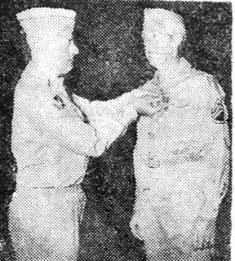 S/Sgt. David E. Turner of Mooresville, N.C., disproves the theory that this is a young man's war. Turner, age 40,
is seen receiving the Bronze Star Medal from Col. Douglas M. Johnston at an ASC base in I-B Theater.
S/Sgt. David E. Turner of Mooresville, N.C., disproves the theory that this is a young man's war. Turner, age 40,
is seen receiving the Bronze Star Medal from Col. Douglas M. Johnston at an ASC base in I-B Theater.
|
APE INTERFERES
Trees of the jungle tottered and fell across the line, so that men had to be routed out at night to make repairs. Even the Burmese animals produced trouble, one ape walking in on an astounded switchboard operator to play with the pretty cords and plugs.
When the vengeful floods of the last monsoon swept away bridges and covered part of the Road, wire communication had to continue. Men were drowned in an effort to maintain it. But maintain it they did. After the attack on Myitkyina, it was essential to provide communications for the troops. So during the monsoon's height, Signal Corpsmen struggled to build a line through the flooded Mogaung Valley.
UNDER FIRE
Boats and every other means of transportation were used to get wires into Myitkyina before the ground was dry enough to start forward from Warazup with the Road building. Signal Corpsmen were frequently under fire and worked with a carbine over one shoulder and equipment over the other.
One Signal battalion, with its accompanying Indian labor, made camp in preparation for building more line about a mile from where the battle of Muse was raging. In the same way, when fighting was about four miles south of Lashio open wire pole lines had reached a point two miles north of the city.
PHOTOGRAPH WAR
Such were the exploits of the wire men. The radio men paralleled them as they went along on liaison work with the Chinese making jungle marches and enduring every hardship. Photographers, likewise, went to the very front line. The Roundup among others is indebted to them for action pictures showing first hand the progress of the Allies in North Burma.
Not every man can be cited in an order. However, the chief of the Signal Corps in the India-Burma Theater, Brig. Gen. William O. Reeder, says that the citation of "King" James is in a sense the citation of every man from buck private up who contributed to making Signal communications forward from Ledo an "outstanding feat of the U.S. Signal Corps.
MARS TASK FORCE CONTRIBUTES TO 'YANKEE INGENUITY'
HQ., MARS TASK FORCE - Besides giving the Japs considerable trouble throughout Burma, members of the Mars Task Force also contribute a great deal to the ever-growing volumes on Yankee ingenuity.
Capt. Dwight M. Burkam, squadron chaplain of the 124th Cavalry Regiment reports the following contrivances and recipes improvised by the Marsmen:
A cigarette lighter made from a carbine shell, wick made of cotton drawn through the firing pin hole of the shell. Carried in a waterproof match box containing gasoline. Strike flint with scout knife. Guaranteed.
Pancake griddle made of end plate of mortar ammo case or the end of a captured Jap gasoline drum pounded slightly concave.
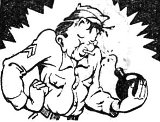
|
Pancake turner made of steel mirror or large spoon pounded flat.
Pancakes made from C-ration biscuits soaked in water to three times normal size and fried in bacon grease.
Popcorn popper made from fruit cake can and a mortar ammo rod.
Breakfast cereal from C or Mountain Ration cracker. Crumble, soak in hot water, drain off, add sugar and condensed milk. Delicious.
Table cover made from unsalvageable parachute cloth used for airdropped supplies. Select any color, cut to size, edge the cloth by pulling out certain threads on each end of the cloth.
Communion cups made from 1-inch bamboo stock cut above the joint. Use joints as bottom of cup. Mugs can be made of larger (giant bamboo) in the same manner.
Glass cups (small) made from distilled water bottles provided by medics. Large sized cups made from plasma bottles. Fill bottle to desired level with motor oil and plunge a hot rod into the oil. A perfect break results.
Some other items produced by the men include spoons, plates and chopsticks made from bamboo. A bamboo flute, smoke stack and water tank, the latter made from giant bamboo. Other uses for bamboo - a showerhead at a spring; aqueduct from spring to basha, providing running water within the basha; bedsprings, tent poles, flooring, and as a last resort, firewood when no other fuel is available.
Stationery made from British toilet paper. Reverse side of letters from home also make good stationery.
Jam made from dissolved fruit bars.
Chicken chow mein made of native rice and tinned boneless chicken.
Steak made from choice water buffalo or Brahma bull calf.
A hotel deluxe - the porch of an abandoned Burmese temple.
FESTING HIGHLY LAUDS YANK LIAISON PILOTS
WITH THE BRITISH 36TH DIVISION, BURMA - The American Liaison unit with Maj. Gen. F. W. Festing's section of the Northern Combat Area Command's forces in North Burma performs a day by day routine with its "jeep planes" as important to the successful conclusion of difficult campaigns as any of its contemporary higher echelon Air Force squadrons.
Festing declares the unit has played a vital and indispensable part in his troops' accomplishments from Myitkyina to Mongmit.
The outfit, which claims the longest overseas service of any American liaison group, started with Merrill's Marauders, flew down the Ledo Road, was in on the capture of Myitkyina, and kept going through monsoon rains which turned the jungles into simmering muck.
"We flew in the damndest weather you ever saw," says Sgt. Thomas M. Burns, operations chief from Quincy, Fla. "The CAA would have turned over in their graves if they knew under what conditions we worked. Our pilots have taken off when they couldn't see the end of the runway, it was raining so hard."
VARIED JOB
The job of these men and their two-place ships - nicknamed "jeep planes" by Tommy and Yank - is as varied as the jungle undergrowth.
As a flying "Air OP," they carry artillery observers who direct fire of big guns on stoutly-held Jap positions. Air strikes can go in because of them; the pilots of the jeep planes spot targets for the fighters and the bombers whose pilots are less familiar with the jungle puzzle.
To isolated troops, the airborne jeeps bring medical supplies, mail, equipment too delicate to be air-dropped from the big C-47's. They ferry officers on official missions, fly in badly needed reinforcements.
Most important of all, they evacuate wounded soldiers from otherwise inaccessible jungle. They have carried desperately hurt men from fox-hole to hospital in a few hours, where by road the journey would have taken a week or more, if possible at all.
EVACUATION JOB
Many a British soldier owes his life to these Stinson-made L-5's and L-5B's, the latter a new type light ship designed to carry either a stretcher patient of a sitting one. The new models, incidentally, are sponsored by war bond buyers back home and, like the "Angel of Mercy," sponsored by the James B. Angell School of Detroit carry the names of their sponsors painted in bold white letters.
These young pilots, most of them sergeants, are always in danger. Planes have cracked up on inadequate emergency fields - sometimes only a stretch of narrow road running straight for a few hundred yards through the jungles. Pilots have gone on missions and never returned, lost in the wilderness, perhaps shot down by Japs.
One pilot carrying a wounded soldier made a forced landing. A sniper shot the flyer. The patient made his way back, despite his wounds, to tell the story.
At Myitkyina, where this and another unit worked together, the jeep pilots landed on one end of a field, the other end of which was still held by the Japs.
Master Sergeant Preston F. Strohsahl, Parkridge, N.J., flight leader with more than 600 hours of operation flying overseas and nicknamed "The Wheel," was one of the first to land on the Ledo Road, then under construction. He took out a soldier hurt on a bridge-building job. And, of course, the toughest job was flying for the famed Marauders.
But it isn't all glamorous adventure for these pilots whose ages figure about 24 years. Their daily grind is long. many of them average five hours flying a day, every day, including Sunday. Most of them have been overseas for from 14 months to two years and some of them, like Sgt. Strohsahl, are ready to go home. The unit arrived in India two years ago. Its first commander, Capt. Ned O. Epps, Jr., Raleigh, N.C. has gone "Stateside" after 18 months. Present skipper is Capt. George R. Uerling, and Oregon flyer.
Nearly every part of the United States is represented in the squadron. Typical is the forward detachment, now working a few thousand yards from Jap lines with General Festing's 36th Division.
"CATERPILLAR" C.O.
Led by Lt. Robert Parley, Trenton, N.J., who is several times a member of the "Caterpillar Club" - for bailing out of wrecked ships - the detachment includes: Master Sergeant Preston E. Strohsahl, Parkridge, N.J., Technical Sgts. James L. Holston, and Teddy E. Russell, Hamlin, Tex.; Staff Sgts. Anthony M. Apel, Delpre, Kans.; Calvin F. Plakstone Jr., Girard, Ohio; Thomas H. Bowen, St. Paul, Minn.; Robert W. Burton, Syracuse, Kans.; Patrick W. Collette, Knoxville, Tenn., William J. Hagan, Columbia, Mo.; Hugh Murphy, Jr., Philadelphia; Clifford J. Nickorson, Outlook, Mont.; A. J. Barnoth, Boston and D. W. Hobbs, Albuquerque, New Mexico - all pilots.
Servicing the ships, often in jungle blackness, are mechanics Staff Sgt. James A. Cowart, Fitzgerald, Ga.; Sgts. John H. Leverton, Watervliet, Mich.; James Vanlasys, Weskan, Kans.; Robert K. Vancill, Harlingen, Tex.; and David L. R. Watkins, Pueblo, Colo.
Sgt. Thomas M. Burns, Quincy, Fla., is in charge of operations, and James W. Secord, Middleville, Mich., drives the "jeep" truck and the captured Japanese lorry which provides the detachment with ground transportation. Cooks, who keep the boys well fed, if sometimes only on meat from water buffalo potted with a carbine, are Alfred S. Schmidt, St. Paul, Minn., and Refugio Sandoval, Globe, Mich.
XX BOMB MEN GIVEN SILVER STAR, 2 DSC'S
HQ., XX BOMBER COMMAND, INDIA - Two Distinguished Service Crosses, one given posthumously, and one Silver Star have been awarded members of the XX Bomber Command for various feats of gallantry and extraordinary heroism.
Brig. Gen. Roger M. Ramey, CG of the XX, pinned the DSC on Lt. Jack T. Hull in recognition of his "extraordinary heroism" for completing his mission after his left eye had been knocked out by enemy fire.
Hull was on his fourth mission as pilot of the Super-Fortress Pioneer III over the Singapore Naval Base when Japanese ack-ack shattered the bombardier's radio equipment. A flying fragment of the radio destroyed Hull's eye and other pieces lodged in his right hand and arm. In spite of this, Hull made his bombing run, turned the big ship out of the danger zone and then asked for aid.
SENT HOME
Since the presentation, Hull has been returned to the States for medical treatment.
The posthumous DSC was awarded Capt. John A. Dunn for bringing back his seriously damaged B-29 from a raid on Omura, Japan. After Nip fighters had crippled his ship and it was apparent he could never make it back to his home base. Dunn, through "remarkable flying skill," reached a friendly airstrip in China.
Forced to land downward on an unfamiliar field, Dunn crashed into a group of buildings on the other side of the runway, killing himself and three other crew members. The citation pointed out that in sacrificing his own life, Dunn saved the lives of seven of his crew.
DYER'S WORK
T/Sgt. Nathan J. Dyer, right gunner on a B-29, won the Silver Star for crawling into the open bomb bay of his ship without a parachute and repairing the damaged bomb bay doors, thus "saving the life of a valuable crew and an airplane."
returning from an attack on Mukden, Manchuria, the plane's bomb bay doors, hit by Jap flak, failed to close, causing a terrific drag and increased gasoline consumption. Although outside temperature was 40 below zero and the Super-Fort was under attack by enemy fighters, Dyer volunteered to repair the damaged doors, enabling the ship to continue in formation.
HITCH-HIKER GETS HEAVE BY HUNTERS
ASC BASE, ASSAM - Although he didn't actually shoot anything, Pfc. Vincent Vassalo did bring back a very unusual hunting trip story, concerning a wildcat that "thumbed" a ride aboard the hunter's jeep.
After stalking through Assam jungles all day without bagging any game, Vassalo and his comrades, Pfcs. Fred Posher, Harry Baill and M/Sgt. George Gunter, crawled into their jeep and headed for home as darkness fell.
Three times while driving along the winding road the hunters saw wildcats scurry for cover in the dense undergrowth before they could "draw a bead" on them.
The fourth wildcat, however, had other ideas. Instead of running away, he jumped on the hood of the moving vehicle and fixed its excited occupants with a menacing eye.
After much shouting and considerable "finger trouble," Vassalo reached out, grabbed the animal by the throat and finally threw him to the ground.
The shaken hunters spent the rest of the trip asking each other why no one had thought to use his carbine.
Far-Flying EAC Men Set Distance Records
HQ., EASTERN AIR COMMAND - Four world flying records have recently been set by far-ranging American and RAF aircrews of EAC as Allied planes strike deep into Jap territory to reach fatter targets.
Strategic Air Force Liberators recently covered 3,000 miles on one 19-hour operational mission, equivalent to a non-stop trip from London to Moscow and back. An RAF Mosquito went 2,400 miles in eight hours and 50 minutes on a photo flight.
A pair of Beaufighters traveled 1.300 miles in attacking shipping off Tavoy, 200 miles southeast of Rangoon, a feat comparable to English-based fighters hitting Milan and Second Air Commando Mustangs last week flew a distance equal to that from London to Vienna and back in striking the Don Muang airfield.
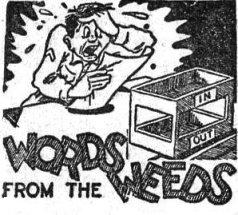 Dear Roundup: A recent release from the Office of War Information (Roundup - Mar. 15) stated that "A detachment of Negro Engineers, the 843rd General Service Engineer Regiment, using British and American equipment, first began work on the road at Ledo." According to the history of the Black Aviation Engineer battalion, it was the first American unit to begin work on the Ledo Road. Inquiries have been made, and it has been determined that the 843rd General Service Regiment did not work on the Ledo Road - Lt. Richard J. McDuffee, APO 689. (The OWI erred in its release to The Roundup. A check at I-B Headquarters disclosed that there never was an 843rd GSE Regiment in the Theater. Censorship does not permit release of the original Engineer Aviation Battalion designation. - The Editor.) |
|
FIRST CONVALESCENT
Dear Roundup: You ran a piece (Roundup - Mar. 8) headed "New Type Recovery at Calcutta Camp." Although we are interested in the good work of kindred units, it gives us a bit of a twinge to read of the Calcutta camp as a "new type" and one that "probably will be used as a 'model' camp for those planned in the future." Since we are rather proud of our work here, may we set the record straight without taking anything away from our friends at Calcutta. We believe that we were the FIRST camp of this type not only in the Theater but anywhere in the world. There have been other convalescent programs and rest camps, but we think the First Convalescent Camp was the first installation to set up as such for the purpose of physical and educational reconditioning. Originally carved out of the jungle and lacking facilities we would like to have for our work, the camp is nevertheless achieving gratifying and successful results. - Lt. Charles Boyle, APO 689. |
|
ANY TAKERS?
Dear Roundup: In a recent issue (Roundup - Mar. 8) there was an article regarding SOS troops volunteering for service on the Ledo-Burma Road. I and a lot of other fellows wish it could be amended to read ALL units in the India-Burma Theater. Unfortunately, we don't come under the SOS heading, so we will probably miss out on the opportunity to undertake a wonderful experience. I don't know how deep the feelings are that the other fellows have toward driving over the Ledo-Burma Road, but mine are deep enough to cause me to try to transfer into an SOS unit. At present I am a master sergeant, but the grade of private will be acceptable if I can get a chance to drive over the road to China. I hope that someone will read this and be interested enough to drop me a line - thereby giving me the opportunity to initiate a letter request for transfer. Army regulations say that an enlisted man must have permission from the commanding officer of the organization to which he is applying for transfer before submitting the original letter. - M/Sgt. Jesse W. Eyler, APO 690. |
Assam Hillmen New Converts To Air Travel
AIR SERVICE COMMAND BASE, ASSAM - Recent events have caused the Dufflas, hill people of Assam, to be no longer content with their usual mode of travel by foot. Civilization has at last reached them and when it did it happened with a bang.
A short while ago two Dufflas arrived at a tea planter's home with a story that a plane had crashed near their village in the hills and that there was one survivor of the crash. According to the hillmen the man was hurt pretty badly with a broken leg and possible internal injuries. They claimed that the man couldn't be moved.
The Air Service Group at this jungle Air Service Command Base was notified immediately and a search party composed of Major Harl D. Mansur, Flight Surgeon, and Captain James O. Foster, Jr., who had been in the hills on previous treks, started out to find the injured man. They flew up to the tea planter's home to start on the journey guided by the two Dufflas that had reported the crash.
SCENE OF CRASH
Meanwhile at this base supplies and food were being gathered to take up to the scene of the accident. Major Harry G. Davis and Captain Alexis M. Durham drove a truck out to the Political Officer's home to pick up more guides for the trek. In order to save time the two officers decided to fly the men and supplies up to the planter's place.
The guides piled into the truck for the ride into this airfield and made the journey with no mishaps. They were loaded onto an airplane with the supplies and Davis took the plane off the ground. The reactions by the Dufflas at first were varied. One man was practically scared out of his wits. He covered his face with his hands and refused to look out.
About four of them huddled together and practically shook in their fear, while the other two looked around with much curiosity. When the plane arrived at its destination the Dufflas upon alighting practically kissed the ground, but it could be seen that they had enjoyed the ride and had been converted over to the advantages of air travel.
CALLED OFF
By the time the plane load of Dufflas arrived, the American officers had received word to call off the rescue effort as the mission had been accomplished by the Air Rescue personnel who parachuted to the scene of the wreck. The officers were flown back to their base and dispatched a truck to return the Dufflas.
But the Dufflas had arrived at one stride into the air age. They held a pow wow and demanded transportation back by air - no more old fashioned truck travel for them. It was only after long involved explanation concerning the costliness of air transportation and that it was either got by truck or by foot that the Dufflas reluctantly agreed.
Burma Air Lift Doing Great Supply Work
ASSAM - The Burma Air Lift, backbone of Theater aerial and ground combat supply prior to the completion of the Ledo Road, is still a lusty carrier of the sinews of war in the southward campaign against the Jap. Starting at scratch in the supply bashas of Upper Assam, a Roundup correspondent traced the scheme of aerial logistics recently and found that though the targets of supply in the heart of Burma are more exciting, the fountainhead of supply, and the men who do the trick, are solidly interesting.
It goes like this: Air Service Command and SOS (depending upon which infielder fields the supply ball); to Combat cargo Command: to Tactical Air Squadron or Aviation Engineers or Ground Forces.
In bamboo-poled godowns in the tea gardens, the men of Lt. Col. George P. Kiene's Air Service Group were rounding up the material on the morning of Roundup observation. Certain bashas had Signal Corps wire and other electrical equipment and there supply soldiers T/Sgt. Joseph P. Stallings and Cpl. Jack Virzi, were on the job, directing Indian Army troops in loading the liaison truck which would later show up at the moonlit ring tent on the airfield, the "Hq of the Burma Express," run in most departments by blonde, determined S/Sgt. Jack W. Hall.
FIXES PRIORITY
It was Hall's work to keep in constant touch with Capt. Henry W. Moody, ASC man and the S-4 of the outfit, Maj. R. W. Hagenbuch who decided which materials had priority; for instance: gasoline, oil, bombs, ammunition, Air Corps technical supply items, signal or aviation engineering supplies and equipment. Hall kept the trucks moving to the right airplanes, bossed the laborers, and generally aided the pilots of Combat Cargo Command to do a job uncluttered by ground details.
In other locations at the ASC Group, men were getting complete engines ready for shipment, assembling drums of asphalt, and some of these workers were: Sgt. Clifford A. Shinolt of Columbus, Ind.; Cpl. Beverley O. Scott of Roanoke, Va.; Sgt. Arthur J. Floyd of Danielsville, Ga.; S/Sgt. Leo T. Bell of Holland, Tex.; S/Sgt. W. H. McCusker of Pawtucket, R.I.; Cpl. Willard R. Sorenson of Petaluma, Calif.; among many others on duty at the time.
Near Hall's tent on the loading apron, Cpl. Joseph J. Thompson, Scranton, Pa., directed crews of Indian laborers in lining up dumps of supplies and in loading such C-47's as the Myrt 'N' Mike, piloted by Lt. W. M. Sims, Jr., of Kannapolis, N.C., and co-piloted by F/O John F. Donahue, Jr., of Uncasville, Conn., and the Boots, piloted by Henry Sander of Chicago and co-piloted by Lt. C. C. Joss of Cedar Rapids, Iowa.
MILK RUN
Some of the ASC men on the Air Lift job who mingle with the flying personnel of Com-Car and get a great time out of it, are Pvt. William Guess of South Norfolk, Va., Pvt. Ralph Kavanaugh of Detroit, Mich.; Pfc. Philip Rifkin of Bronx, N.Y.; Sgt. Calvin Pruitt of Ashland, Ky.; Cpl. Donald Aukes of Buffalo Center, Iowa; and S/Sgt. John Morrow of Miami, Fla.
Once the cargo is aboard and lashed securely, the C-47's start the milk run without ceremony, and by now the pilots have memorized most of the ridges of the Patkai "fence" separating Assam from Burma, the flats and ridges of the Hukawng Valley and the jungle-covered plain of Myitkyina Valley leading on down the Road to Mandalay and the advanced airstrips.
According to the radio operators, sometimes the ships go most of the way by instruments and end up by "nosing around" for their airfield. The radio men, incidentally, have more experience on the line than some of
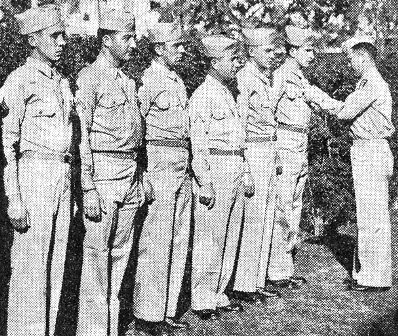 Purple Hearts are presented to former members of Merrill's Marauders by Maj. Helmut Schmidt, Headquarters commandant
at New Delhi. These ex-North Burma combat men are now assigned to headquarters here, most of them serving in the
guards. From left to right: T/5 Edward J. Kinslend, Pfcs. John Scarborough, Leo A. Cinninotta, Herbert D. Gardner,
Glen D. Seifries, and Richard W. Shootman.
Purple Hearts are presented to former members of Merrill's Marauders by Maj. Helmut Schmidt, Headquarters commandant
at New Delhi. These ex-North Burma combat men are now assigned to headquarters here, most of them serving in the
guards. From left to right: T/5 Edward J. Kinslend, Pfcs. John Scarborough, Leo A. Cinninotta, Herbert D. Gardner,
Glen D. Seifries, and Richard W. Shootman.
|
NEW PILOTS
In this way, radio operators and air crew flight engineers are frequently "sweating out" the idiosyncrasies of new pilots, some fresh from the United States and new to the monsoon-ridden cloud lands over the teak and palm jungle's of Kipling's kingdom. A few of the trusty radio operators and engineers on the Air Lift are S/Sgt. C. R. Smith, Princeton, W.Va., Sgt. H. W. Garwood, Columbus, Ohio, S/Sgt. G. W. Aldridge, Los Angeles, Calif., Cpl. Henry J. Poile, Emhurst, Ill.; among others currently on duty.
At the fields and strips, Indian soldiers of the Army Supply Corps., Burmese wallahs and Allied troops of numerous outfits, are on the job ready to swing the cargo out into the trucks. Usually there is a man from either SOS or Air Service Command, and frequently from Liaison Squadrons of AAF, there to direct the unloading.
A few of these SOS Quartermaster Sub-depot men deep in the yellow dust of Burma doing "Wells Fargo" work are Pvt. Berl Cart, Buffalo, Wyo.; Pfc. Hugh D. Stowe, Commerce, Ga.; Sgt. Edward McKernan, Queens, N.Y.; among others on duty at the time at a certain field.
In quick time the Com-Car crews ascertain their next assignment from field monitors and start back, either to another field to return an engine for Fourth Echelon work at a rear depot of Air Service Command, or to take back personnel or equipment. It's a touch and go affair, with the many Commands correlating their efforts and seldom if ever missing out on an assignment, regardless of weather.
From The Major To The Corporal Goes Barclay
By SGT. ARTHUR HEENAN Roundup Staff writer
Don Barclay, USO caricaturist, is convinced that as far as the brass is concerned women make the world go 'round.
Barclay is back in the Orient again on his second tour. He was last here in November, 1943, and when he left, promised he would be back. That promise is usually made by every performer but the 52-year-old Don is the first one to make his words reality.
"What I really need to get a real warm welcome is a chorus line," sighed Barclay. "Since the war started I've been overseas for about 13 months and the routine is always the same.
BRASS GLAD HAND
"I arrive at an installation and a brass hat hurries to the plane and gives me the glad hand. His first question is, 'Where are the girls?' I always have to tell him of course there are no girls. Then the brass will hurriedly shake hands again and holler, 'Hey Corporal, take care of Barclay.'"
Don says the India-Burma Theater has changed a lot since he was here last. He pays tribute to Air Transport Command for service that he says compares favorably with any civilian line.
ATC AMAZING
"It's amazing the way they run up with those steps, keep you primed with food and make sure to wake you to catch your plane," marveled Barclay. "In the old days you'd flop on the floor with a bunch of casuals between planes and many times no one bothered to call you, or if they did, it was done in a whisper. Why they even lead you to a latrine now when you get off the plane. No more runway latrines. Yep the old days in the CBI have gone forever."
Barclay's last entertainment stop was the Philippines. He came over here on the longest ATC over-water hop, from Australia to Ceylon. He and the crew dreamed up a long-snorter bill "which we hope to keep exclusive" says Barclay. "I know some character back in Hollywood who spend most of their time autographing their own short-snorter bills when they haven't been out of their own back yard."
PLAYS GOOD DRUNKS
Barclay, who has done some character parts in the movies, generally portraying a drunk, is a little cynical about the way some name stars cash in on publicity. He says he knows at least one star who hired a topnotch publicity man to headline his overseas tour a month before he even started on it.
"I don't think there is a star who has returned who hasn't had his or her performance interrupted by a bombing raid or a sudden attack," muttered Barclay. "That's the stock line now."
Barclay's specialty is drawing caricatures of G.I.'s and making them a present of the effort. He estimates that he has caricatured 10,000 G.I.'s since he started his overseas travels.
LEAVES FOR CHINA
Don was one of the original organizers of the Victory Committee in Hollywood. He was the first to organize 50 shows on the road, most of them playing camps and hospitals.
We saw him just before he was ready to leave for China. After completing his tour there, he will travel the India-Burma Theater.
"Can hardly wait to get out to the airport and get some more of that ATC super-service," he grinned. "And to think we get all that without any tips. If some of those civilians could only see it, they'd die of envy."
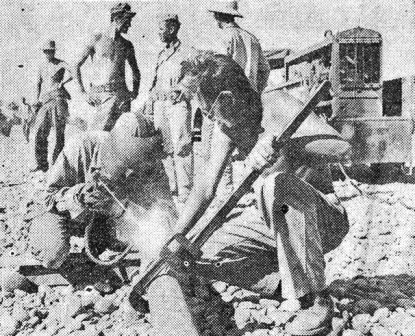 Working on the new pipeline to China, two G.I.'s weld a length of six-inch pipe. Left to right: Sgt. Roberts Coffield
and Pvt. Emil F. Nodzak.
Working on the new pipeline to China, two G.I.'s weld a length of six-inch pipe. Left to right: Sgt. Roberts Coffield
and Pvt. Emil F. Nodzak.
|
TOLD BY MISSING G.I.
Roundup Staff Article
A short time ago Radio Operator Joe Zuber went down over The Hump.
His mates of the 1330th BU in Assam sadly sorted his personnel belongings. Among other things they found the following, written in pencil on both sides of a blank radio sheet and evidently composed on a previous flight:
"If it were only possible to put on paper the greatness and beauty of the world up here above milky white clouds, I would want to be the one entrusted with such an undertaking."
"Up here just a score of thousand feet it seems impossible that there below exists strife and desolation, while here the black touch of mankind has done nothing to mar the beauty which is God.
'CLEAN, PURE WORLD'
"The sun rises over a clean, pure world of soft, fluffy clouds, and sets over the same each evening. One feels like an intruder stepping into a place of peace and solitude that could exist in only one place.
"Could it be that here is where the souls of the pure in heart go to escape the darkness of the earth?
"I rather think not, or God would not allow the waves carrying the filth and lies broadcast by enemy countries to filter through and cause the spoil.
"I would stay here forever, but my body is still alive and I grow hungry for the things of the earth and must return down there; from the purest white to the darkness once more."
WE'LL SEND IT
Pfc. Thomas C. Beaman, one of the G.I.'s who sorted Joe Zuber's belongings, sent the piece to the Roundup.
He wrote: "if this appears in the publication we'd all appreciate it up here if you'd send a copy of it to his wife and mother in Williamsport, Pa. He has a two-month-old son there he'd never seen. They might want to show it to the kid some day to let him know what kind of guy his old man was."
We'll send the copy, soldier.
Tribute To I-B Theater In 'Objective, Burma!'
(Editor's note: The following is a review of the motion picture Objective, Burma!, presented in a prevue at Theater headquarters.
The picture starts its India-Burma G.I. circuit run this week.)
Roundup Staff Article
Objective, Burma!, Warner Brothers motion picture starring Errol Flynn, was screened this week at Theater Headquarters. The picture, which will appear at the various basha cinema houses on the rice paddy and jungle circuit, has reached the screen with a great atmosphere of reality.
The Roundup feels that Objective, Burma! is a must for the Americans, Indians, British and Chinese from Karachi to Lashio. The film is dedicated to the armies of the four peoples in India-Burma.
AIRBORNE ATTACK
Authentic as is possible for any war picture, Objective, Burma! graphically tells the story of an airborne attack on a Burma Jap radar station - a prelude to the Cochran-Wingate glider invasion a year ago.
Errol Flynn has never appeared to better advantage, this time sans women in any supporting role. Henry Hull gives an outstanding performance in the supporting role of a war correspondent.
There is hardly a false note in the entire production. As a whole, the film is a very faithful cinematic replica of "our" war. All who worked with it are to be congratulated.
GENERALS SHOWN
Lord Louis Mountbatten, Gen. Joseph W. Stilwell, Lt. Gen. Dan I. Sultan, Maj. Gens. Frank Merrill and Order C. Wingate, and Col. Phil Cochran are shown in the early footage of the picture, which runs almost two and one half hours.
The Chinese training center at Ramgarh is given a fleeting moment of the screen, and Assam bases appear in early morning authenticity which can and will be appreciated by thousands of troops, who will see a reflection of their myriad tasks.
REAL THING
The aerial shots over the Burmese mountains are the real thing, and even down to dialogue between Americans and Gurkha guides, the picture maintains its atmosphere of reality.
Although produced in part at Fort Benning, Ga., Objective, Burma! never loses its sense of "happening on the spot." C-47's skim over the runway at Sylhet in the early dawn. The food and munitions dropping outfits will appreciate the picture as Flynn's dauntless platoon is supplied from the air.
The Roundup believes that the men who have fought the enemy in the jungle are going to appreciate the seemingly real mood in which the combat sequences have been filmed.
FINE MOOD
Objective, Burma! is one of the few pictures that have been able to sustain edge-of-seat suspense during sequences without dialogue. As Flynn's decimated platoon cuts its way through the jungle not a word is spoken for minute on minute against a background of screaming birds and weird jungle sounds. The mood created by the night battle upon the crest of a hill is exactly as that produced by description of related events to this newspaper by men who have fought the Japs in the jungle.
Objective, Burma!, with its fine film editing, good acting, good understanding and proper basic preparation presents an admixture of fact and fiction, which approaches as nearly as possible in the photographic medium, an historical film document.
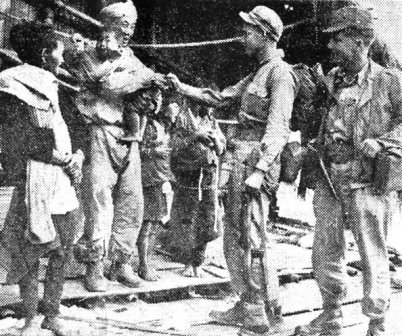 Able to converse only in sign language, a mountain-dwelling Kachin family bids
farewell to Sgt. Norman Boatman
and Pvt. Lowell Pendleton, extreme right, liaison personnel with the Chinese Army. G.I.'s make friends all over
the world and Burma is no exception.
Able to converse only in sign language, a mountain-dwelling Kachin family bids
farewell to Sgt. Norman Boatman
and Pvt. Lowell Pendleton, extreme right, liaison personnel with the Chinese Army. G.I.'s make friends all over
the world and Burma is no exception.
|
EVERY MOUND A JAP
ON MARS GUARD POST
Roundup Staff Article
Guard duty on a new perimeter which has just been taken from the enemy, "where the bushes seem to move and mounds of dirt appear to be creeping upon you," is the unforgettable experience of Pfc. Gabriel K. Martinez of the Mars Task Force.
Martinez, from Pasadena, Calif., this week graphically related how it feels.
"I believe that any experience that I may have encountered during combat could not be as unforgettable to me as guard duty on a new perimeter that has just been taken from the enemy," he declared.
LONELY FEELING
"During the hours between the time the sun sets and the moon rises you get a lonely feeling. The songs of the birds are sadder than ever before and even the slow-running stream seems to babble a death chant.
"In the darkness - a darkness that one can see only in the heart of the Burma jungle - your nerves rise on end as you sweat out an unfamiliar sound in the bushes beyond.
DAWN RELIEVES
"As you stand alone in the earth's deathly silence, a silence that can be heard for miles around, the bushes seem to move, mounds of dirt appear to be creeping upon you - and, finally - being able to stand it no longer, a hand grenade is turned loose, and then all is quiet again.
"The morning light is all that relieved such anxiety. These things I shall never forget."
Martinez, with one year in the Army, has spent seven months of it overseas. He wears the Combat Infantry badge.
ASC 30 Year Veteran Recalls World War I
AN ASC BASE, INDIA - "Just a recruit," said Maj. Herbert A. Nelson, Lakeland, Fla., to a fellow officer who had proudly announced here the other day that he would soon have five years of active Army duty. The major is well qualified to make such a statement. He recently celebrated the completion of 30 years in the service.
Nelson enlisted in the Army on Jan 3, 1914, and was at the Rock Island, Ill., Arsenal when the United States declared war. He at St Nazzaire in June 1917 and went into action five months later.
CROIX DE GUERRE
Later he transferred to the 26th Division and was awarded the French Croix De Grois for distinguishing himself at Apremont Woods in April, 1918. His Ordnance outfit supplied and maintained two battalions of eight-inch howitzers which fired two days and nights without stopping.
Nelson tells how he was instrumental in capturing a German spy during the last hectic months of the war. The American troops were dispersed, but the enemy still continued to pour over the lead with zero range. No matter where they moved in, the German fir would seek them out.
Nelson noticed a farmer plowing his field nearby, seemingly a commonplace occurrence, but each day he would have a different combination of animals on the plow. On day a mule and a horse; next day and ox and a mule, a mare and an ox and so forth. Nelson reported his suspicions to Intelligence, and it was determined that these odd combinations where the tip-off to a German Artillery Observation Post.
PURPLE HEART
Maj. Nelson wears the Purple Heart as a result of being gassed once and wounded in the legs and feet with grenade fragments. Commenting on his 30th anniversary, Nelson who was commissioned a captain in 1943, said, "I've looked forward to this day for a long time, but I never thought I'd be in India when it arrived."
|
By. SGT. CHARLES W. CLARK
Roundup Staff Writer
Here's a note of interest to cribbage-playing Col. C. W. Hanna: Remember that "perfect hand you had one night not long ago (Jack of Diamonds, fives of Spades, Hearts and Clubs? We Cpl. J. M. Cassidy of APO 466 writes that you'll "have to play a lot of cribbage before holding that hand again." He sent along a clipping from Collier's magazine, revealing that the "perfect hand" is due to be dealt only once in 216,571 times. That's a lot of cribbage.
* * * * * * *
Sgt. Phil Klein, chief clerk of the P & T Passenger Section at 1347th AAF BU, is not above padding his post-war nest when an opportunity presents itself. An old friend of his, Lt. Abe Oliver, whom he had know for eight years but hadn't seen in 26 months, stepped into Klein's off recently to book passage back to the States. Needless to say, he got the best to be offered. Oliver was (and will be) Klein's boss in civilian life.
* * * * * * *
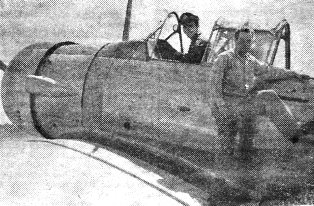 Chaplain James J. Minehan, standing, climbs into his plane with pilot Lt. Jerry B. Murphy to take off on a
flying tour of various 12th Bomb Group Bases, where he holds regular Sunday services.
Chaplain James J. Minehan, standing, climbs into his plane with pilot Lt. Jerry B. Murphy to take off on a
flying tour of various 12th Bomb Group Bases, where he holds regular Sunday services.
|
* * * * * * *
Recent promotion to the rank of major, at the tender age of 22, is the latest achievement of William C. Dabney, Jr., squadron commander in the Seventh Bomb Group, 10th Air Force. A look at Dabney's service record shows: The Purple Heart, Distinguished Flying Cross, Air Medal with Oak Leaf Cluster, Presidential Unit Citation with Two Oak Leaf Clusters, 48 missions and 414 combat hours. A transfer from the RAF, he has accumulated these honors in missions over England, Africa, Sicily and Burma.
* * * * * * *
It's really tough on snakes when Pfc. Marland Rice takes a "saunter" through Burma jungles. Ground observer for a Signal Air Warning Service, 10th Air Force, Rice, accompanied by a buddy, recently killed three pesty pythons along the banks of a jungle stream with their carbines. Laid end to end, the reptiles measured some 42 feet from stem to stern, which is a lot of snake.
* * * * * * *
Capt. James R. Mockbee, commanding officer of the Global Planesmen, an Air Service Command group, knows only too well how dry and boring frequently-given Army lectures and movies can be. To off-set this, he now has ice cream served to his men during the intermission between the Sex Morality and Articles of War films. Sex and ice cream, what a combination!
|
NEW YORK - (UP) - Columnist Leonard Lyons this week reported hard-pressed President Roosevelt had told Maj. Frank Owen, editor of SEAC newspaper, that "sometimes I feel I'd like nothing better than to sit in the Burmese jungle and read a newspaper."
The President pointed wearily to the documents piled on his desk as he made the statement, after Owen had described how his paper, SEAC, is parachuted daily to units fighting in Burma.
Lyons told further of Owen's meeting with Gen. Joseph W. Stilwell, who asked him if he were a colonel. "No sir," said Owen.
Said Stilwell, "Good. Out there colonel isn't a rank, it's an epithet."
Col. D. D. FitzGerald New Chief Of Staff
For India-Burma ASC
HQ. INDIA BURMA AIR SERVICE COMMAND - Col. D. D. FitzGerald, Air Corps, formerly Chief of Staff of the Eastern Flying Training Command, headquartered at Maxwell Field, Montgomery, Ala., has arrived in India and assumed his new post as Chief of Staff, India Burma Air Service Command, at the Headquarters near Calcutta.
This makes the second time the colonel has served under Major General T. J. Hanley, Jr.
In the overseas Theater, Col. FitzGerald finds many old friends - and some very important relatives: his son-in-law, Lt. Col. D. M. Wright, Maintenance Division, I-B ASC; and his brother Brig. Gen. S. W. FitzGerald, president of the AAF Evaluation Board, I-B AAF.
FRESH PORK DELIVERED FOR EASTER
Old-fashioned smoked ham and other fresh pork products were served for Easter Sunday dinner to American troops throughout Assam and other forward areas in India and Burma.
Lt. Col. C. T. Nordstrom, Chief of the Quartermaster sustenance Division, and his staff planned this homey touch long ago when they made arrangements with the Army's piggery in Calcutta to ship 61 tons of fresh meat to the men up front for this year's Easter dinner.
The QM Substinencence chief pointed out that the Army has just set up a piggery in Ledo, and that in the not too distant future there will be even more fresh ham for the boys in Advance Section 3 and surrounding areas.
|

By S/SGT. KARL PETERSON Roundup Staff Writer
An increasing number of young hopefuls in the India-Burma campsites of America's Armed Forces are going into the newspaper business, armed with a battered typewriter or two, a Camp News Service or ANS press file and unlimited editorial zeal, much of it based on having seen the movie The Front Page. The smaller operators in the deep tangled wildwood, those who get by with only a borrowed mimeograph machine and a helpful radio operator frantically copying the BBC news, have troubles enough, but editors of I-B's big "metropolitan" sheets must face the peculiar difficulties involved in printing their papers in Indian print shops.
FOLLOW COPY
One cannot avoid an uneasy feeling when he enters the print shop for the first time and finds his English-language paper being assembled by Indian linotype operators and make-up men who chatter to one another in Hindustani. With a limited knowledge of English, these boys simply follow copy. A playful Roundup staffer one dull afternoon inserted some horrid profanity in the copy he was writing, intending to pencil it out later. He forgot, and when the first gallery proof came back from the print shop, the expression had been faithfully reproduced.
Versed in British-style newspaper publishing, Indian pressmen are understandably baffled by phrases like "Buckeye gridders nip Hoosiers" or "rugged chow whipped up by G.I. slumburners," and no power twixt earth and sky can stop linotype men from such British spellings as "honour" and "theatre." However, they all show an unfailing appreciation for American cheesecake, the more luscious specimens being pronounced as "Thik" with much flashing of teeth and hand gestures.
One of our favorites is our Sikh stereo-man, Lal Singh by name, a demon of energy. Bulling a page form from its table on to his machine one day, he inadvertently let the edge hang over, and handset type rained out on the floor amid agonized groans. Eager to correct the error and recover lost times, he quickly reassembled the "pied" matter - and only a last-minute check saved us from going to press with Cleveland in fourth place in the National League. The little cartoon "goofies" used to illustrate humorous short items are hard to fathom when set in metal, so it was not surprising when our pride and joy hit the streets one morning with a cartoon of a man driving his automobile in what was evidently inverted flight.
INDIAN TO CONGRESS
Lino-men work on piecework rates, so set their names at the head of each gallery of type, to be removed after the "charge proofs" used in reckoning their paycheck have been run off. It was inevitable that one of these industrious souls should one day get into the paper, but we hardly thought to fit him in so neatly. It was necessary to replate late one night to prevent the Roundup from announcing that "D. Chakravarty" had been elected to Congress from the 4th District in Pennsylvania.
"Every newspaper has typographical errors" as one of our employees says by way of consolation whenever our columns refer glibly to "Brigader Genral Etaoin Shrdlu's arrive in Myitkyina" or some such item. But typos can be funny, as any New Yorker reader knows, or even dangerous. No editorial comment was intended when a photo credit very nearly came up last week as "Press Association Phoo."
OTHERS' TROUBLE
Our contemporaries likewise have their troubles, as the Command Post, which in one edition referred, on facing pages, to a "big navel battle in the Pacific" and showgirl Sherry Britton "displaying her naval." Or the Yankee Doodler, which recently announced to a puzzled public that a private on their base intended postwar to return to the "school of Glology at Univ. of Penn." The China Lantern fumbled a headline which designated the heroic L-5 planes as "mighty mights of the air." This was negligible to the embarrassment of the Roundup when a baseball story about manager Luke Sewell of St. Louis stated that "Stilwell led his Browns to New York."
|
Safe in their cans all over the world today, awaiting the moment of Germany's collapse, are prints of a motion picture which Uncle Sam's Army is going to show to his boys from Aachen to Zambaonga.
Prepared by the War Department, these movies will show G.I.'s what the future is likely to be after Germany is licked with regard to demobilization and problems of shifting forces from Europe to the Pacific.
Don't think this film will be able to tell you individually whether you will be discharged late or soon, but on the basis of the explanations in the film, you will be able to calculate your own individual points toward discharge pretty well.
MADE TO PREVENT RUMORS
The film, made six months ago, will attempt to explain to you boys the problems of demobilization and reemployment of American forces. It is the desire of the War Department that everybody in the Army see this film within a matter of hours after Germany's surrender, with the hope that it will prevent, check, and overtake rumors.
The War Department wants officers and men to know what the problems are and how the Department hopes to solve them at exactly the moment that the Army will want to know - and that moment is after the Nazis have quit.
It will be the biggest world premiere in the history of motion pictures, and the world has never had, no doubt, a more eager audience to see what the producer hath wrought.
To repeat, this film is not going to tell you when you're going to get out, but when you see it, you're going to have a whale of a lot better idea than you have now.
We know whats on your minds - the minds of the worst, the best, and the rest of you - finishing the job and going home. This film, when it is shown, will give you some idea of the job that's to be finished, how we'll do it, and what your chances are of being demobilized and what time.
JUST ONE OF POSTWAR PROBLEMS
Right now most of us are thinking, "When I get out - " but unfortunately we never think beyond that point. It rarely ever occurs to any of us that probably we'll be facing just as big or bigger crises on getting out of the Army than we did in getting in or staying in it for awhile.
Just one of the national crises among the myriad problems that are going to crop out after the Army (or a big part of it) dons civilian clothes again is the problem of all the swindlers, masterminds of fraud, and confidence men who are going to be after your money. For God's sake, don't be suckers. Taken all together, you soldiers after this war are going to have a yellow, green and silver flood of money. Don't use it to water the pockets of swindlers.
You guys, sailing home with a pocketful of cash, or to wife, mother or other trusted one who's holding the cash or securities for you, are going to be high on the lists of swindlers as likely victims. Your fathers were at the end of the last war. Sharpshooters got $400,000,000 of their money, according to statistics of the Securities Exchange Commission.
EX-SOLDIERS ALREADY BEING BITTEN
Returning soldiers already are being bitten by swindling snakes. Recently a crook published glowing advertisements of how to build plastic homes for $100 per room, offering to let anybody in on the secret for $1.98. Eager ex-Serviceman home-lovers received four-page leaflets on how to mix sawdust and concrete for building blocks.
beware of buying a farm if you know nothing about farming or the value of the land or real estate - until you get somebody you know is honest to advise you. Beware of buying cheap, new merchandise until a good while after the war. The good merchandise in the world today is tied up in tanks, guns, planes, ammunition, and the goods of war. Don't fall for gold mines, oil fields, inventions, jobs, or business partnerships that call for you to lay out your dough. Know with whom you're dealing. Investigate, then invest. Go to the Better Business Bureau in your town if you know no one capable of advising you. You won't be charged for its service.
AN OLD ONE REVIVED
Here's a simple racket which is being revived these days, one which you can deal with simply. You'll get on a sucker list and the swindler will send you some unordered merchandise with the request to send it back if you don't want it. This is a good racket because most busy people, fundamentally honest won't take the time or trouble to send the goods back. So they pay for them. You don't have to return or pay for unsolicited merchandise.
Here's a tip from a particularly smart medical doctor in Grand Rapids, Mich., for this type of racket. He received the following letter with three no-good neckties: "Dear Doctor: We are taking the liberty of sending you three exceptionally fine ties. We know you will like them. Please send us $3."
The physician sent this answer: "I am taking the liberty of sending you $3 worth of exceptionally fine pills. I know you will like them. Please accept them in payment of the ties you sent."
ALL GOLD BRICKS NOT IN ARMY
We hope all you guys are as smart as this doctor when you come in contact with swindlers. Be on your guard when people try to sell you a home, a business, a partnership or try to get you to invest your money. Above all, be on guard against the fellow who's going to make you some "easy money."
Don't be a sucker. All the gold bricks aren't in the Army. You can still buy them in civil life.
That's just one of the things to watch out for when you get out.
The Roundup is a weekly newspaper of the United States Forces, published by and for the men in Burma and India, from news and pictures supplied by staff members, soldier correspondents, United Press, OWI, and Army News Service. The Roundup is published Thursday of each week and is printed by The Statesman in New Delhi and Calcutta, India. Editorial matter should be sent directly to Capt. Floyd Walter, Hq., U.S.F., I.B.T., New Delhi, India, and should arrive not later than Sunday in order to be included in that week's issue. Pictures must arrive by Saturday and must be negatives or enlargements. Stories should contain full name and organization of sender. Complaints about circulation should be sent directly to Lt. S.R. Rose, Hq., U.S.F., I.B.T., New Delhi, India. Units on the mailing list should make notification of any major change in personnel strength or any change of APO.

|
APRIL 5, 1945
Adapted from the original issue of I.B.T. Roundup
Copyright © 2007 Carl Warren Weidenburner
TOP OF PAGE PRINT THIS PAGE ABOUT THIS PAGE SEND COMMENTS
PREVIOUS ISSUE CLOSE THIS WINDOW NEXT ISSUE
 Marguerite Chapman says she likes the sun. Which means that according to the California Chamber of Commerce she
should be out every day in bathing or sun suit. This picture was taken in Hollywood where Marguerite displays her
best points for cinema cameras.
Marguerite Chapman says she likes the sun. Which means that according to the California Chamber of Commerce she
should be out every day in bathing or sun suit. This picture was taken in Hollywood where Marguerite displays her
best points for cinema cameras.
